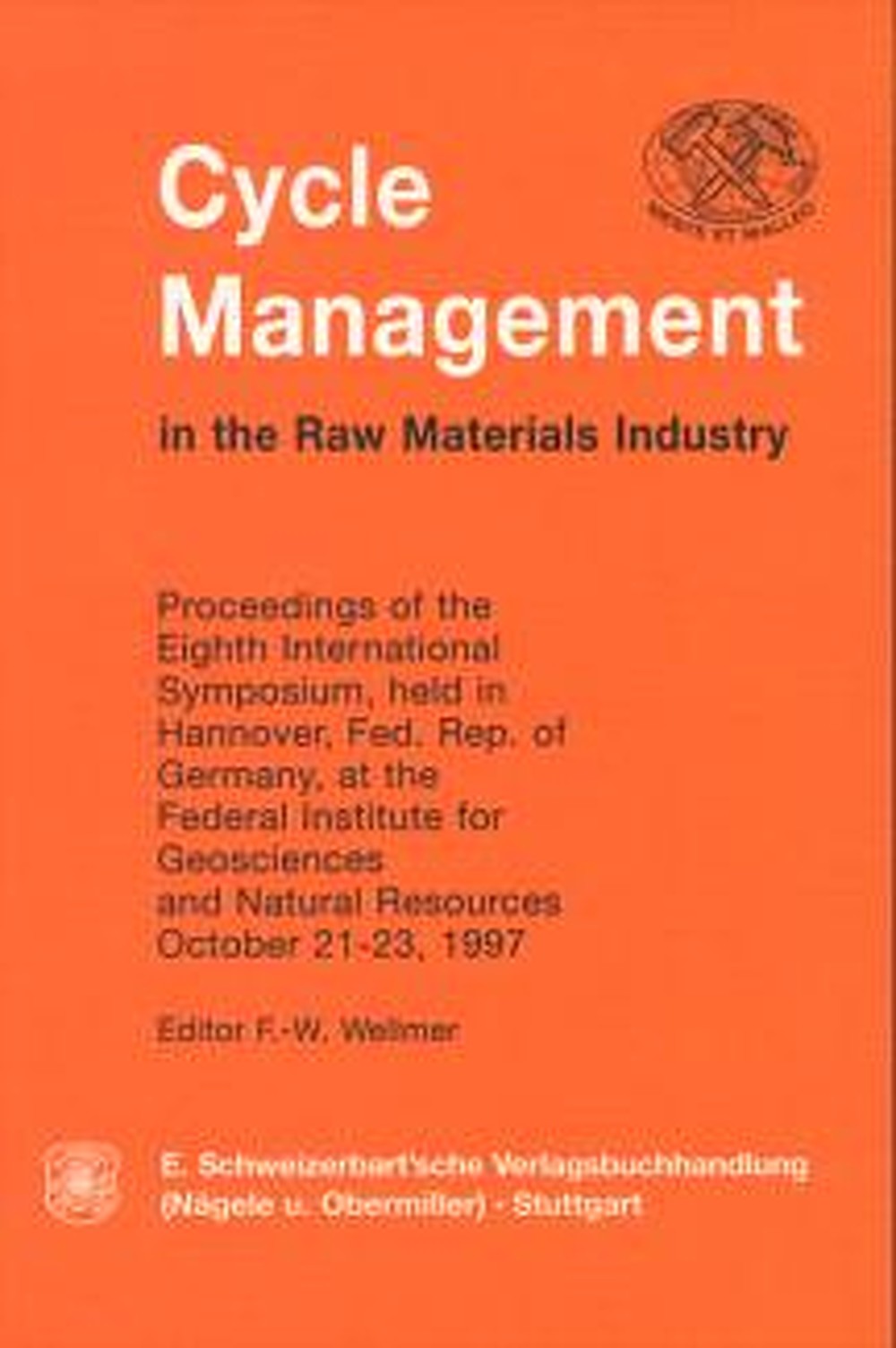The contributions in this volume deal with the cycle management of raw
materials in the raw materials industry and the recycling of lead-zinc,
aluminum and copper and the re-use and recycling of slags. Besides technical
question, legal considerations arising from legislation of recycling and cycle
management are addressed.
The ultimate goal of applying cycle management techniques is to minimize
the environmental impact of the production of mineral raw materials and their
processing and to exploit resources to their fullest. This is possible by for
example:
increasing raw material yield during production and processing,
minimizing the amount of energy necessary for production and processing,
increasing the percentage of recylced raw materials from secondary raw
materials
avoiding the use, or substituting problematic (e.g. poisonous) materials
entirely in industrial production,
and finally implementing environmentally sound disposal procedures for various
raw materials.
The basis of successful cycle management of raw materials is to consider and
optimize the complete production cycle from its production, through industrial
application up to the disposal of these materials after their usefulness has
come to an end.
Inhaltsbeschreibung
top ↑
Die im vorliegenden Band veröffentlichten Beiträge beschäftigen sich mit
dem Management von Stoffströmen in der Rohstoffverarbeitungsindustrie und
dem Recycling von Blei-Zink, Aluminium und Kupfer sowie der Nutzung von
Schlacken. Ausserdem setzen sich einige Artikel mit dem deutschen
Kreislaufwirtschafts- und Abfallgesetz auseinander.
Das Hauptziel des Stoffstrommanagements ist es Umweltbelastungen, bedingt
durch Rohstoffgewinnung und -weiterverarbeitung, zu vermeiden bzw. zu
verringern und mit Ressourcen schonend umzugehen. Dies kann u. a. durch
folgende Massnahmen erreicht werden:
Verringerung der Rohstoffverluste bei der Gewinnung und Verarbeitung,
Verringerung des Rohstoff- und Energieeinsatzes,
Erhöhung der Recyclingrate von Rohstoffen aus Sekundärmateriaien,
Vermeidung oder Substitution von problematischen Stoffen und
umweltverträgliche Deponierung von Abfällen bzw. Reststoffen.
Grundlage des Stoffstrommanagements ist die Einbeziehung der gesamten
Produktionslinie von der Rohstoffgewinnung über die Herstellung bis zur
Entsorgung von Produkten nach deren Nutzung.
List of Contributors V
1 Wellmer, F.-W.:
Preface 1
2 Brandes, G.:
Opening Address 3
3 Hirche, W.:
The German Waste Avoidance, Recovery and Disposal Act 7
4 Schenkel, W. & Troge, A.:
Integration of Environmental Resources Protection, a Global View 15
5 von Röpenack, A.:
The Management of Material Streams in the Metal Industry 23
6 Schwab, B. & Schneider, W. D.: The Production of Zinc
by the Imperial Smelting Method from Secondary Materials 35
7 Meyer-Wulf, C. & Nolte, A.:
Recycling of Copper in the Framework of low Waste Cycle Management 41
8 Paschen, P.:
Impact of Cycle Management on Energy Consumption in the Smelting
Industry 53
9 Geiseler, J.:
The Use of Slag Examples from an Established Cycle Management 59
10 Höh, H.:
Material Flows as Part of the Environmental Economic Accounting 77
11 Kippenberger, Ch.:
Study of Materials Flow and Energy Consumption in the Production of Selected
Mineral Commodities 101
12 Biviano, M. B., Sullivan, D. & Wagner, L.:
Materials Flow Studies - A Methodology to estimate total Materials
Consumption 115
13 Riegel, G.: Environmental Constraints and their Impact on the
Raw Materials Market 125
14 Bijen, J. & Schuurmans, A.:
Assessments to Determine Environmental Impacts of Raw Materials
Production and Recycling 133
15 Martin, E.J.: The Basle Convention and its Effects on Metal Cycles 141
16 Nash, G.:
A Review of the Potential of the Metalliferous Raw Materials
Industry to Further Reduce Waste 149
17 Tabata, Y.:
Recycling of Non-Ferrous Metals in Japan, Situation and Policy 157
18 Motzko-Lisy, F.:
Use of Near Surface Raw Materials by the Construction Industry and the
Potential for Recycling and Substitution 171
19 Schneider, G.:
Closing Address 187
In todays world of ever increasing demand for raw materials,
it has become important to look at raw materials from a systematic
point of view and the energy issues related to them:
to consider them as a single system and to view them
as a whole, from the source of mineral raw material to their sinks.
18 contributions in this volume discuss approaches to and examples
of cycle management applied to raw materials.
The papers show that cylcle management for raw materials is a necessary
prerequisite for sustainable development, to minimize energy consumption,
and waste avoidance.
